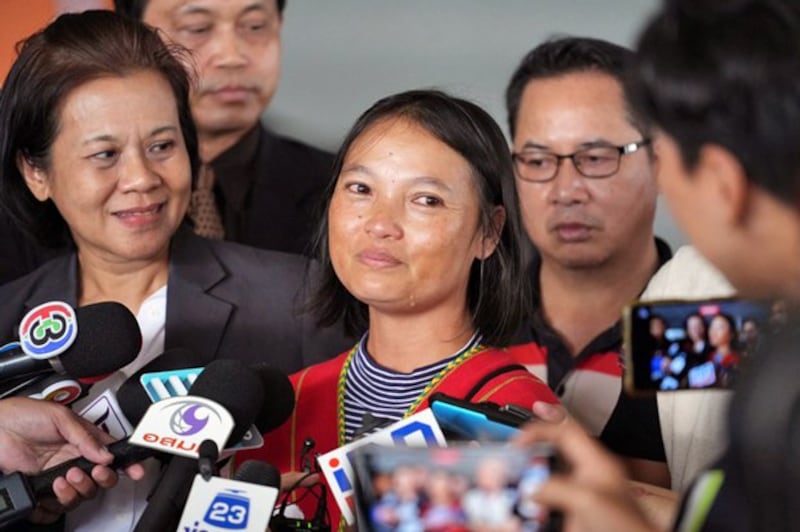A Thai court on Thursday dismissed a murder charge against a former chief park ranger and his subordinates over the disappearance of an ethnic Karen activist, following nearly a decade of proceedings that have put a spotlight on judicial integrity.
The judges said that the testimonies of the accused, Chaiwat Limlikit-aksorn, the former park ranger at Kaeng Krachan National Park, and his three ex-staffers, were dubious, but there wasn’t sufficient proof that they had killed.
The suspects were indicted on five charges last year in relation to the 2014 disappearance of Porlajee Rakchongcharoen, also known as Billy, who was an advocate for the Karen tribal community.
The day Billy went missing, the rangers had detained him for questioning over the alleged illegal possession of honey.
On Thursday, however, the Criminal Court for Corruption and Misconduct Cases found Chaiwat guilty only of misconduct, throwing out more serious charges of murder, unlawful detention, concealment of a corpse and intimidation. The three other defendants were acquitted of all charges.
“The first defendant [Chaiwat] is guilty for arresting Porlajee in possession of illegal honey, but failing to report the case and bring Porlajee to investigators – this was misconduct. He is sentenced to three years in jail, while all other charges are dropped,” the judges said in their ruling.
“Though the defendants’ testimonies were suspicious, there was no adequate evidence to show that they committed a crime,” the judges said.
The testimony of the prosecutor’s witnesses also "did not carry weight to prove that the four defendants killed Porlajee premeditatedly," they added.
The court specializes in prosecuting state officials and others implicated in offenses related to bribery, intimidation, coercion and other malfeasance.
Chaiwat, who is currently director of the government’s national park division, was released on bail of 800,000 baht (US$21,700).
Thursday’s verdict was billed as a test for the Thai judicial system and in particular its commitment to solving enforced disappearances. The outcome, however, was labeled a disappointment by human rights advocates.
“The system allows government officials to stay in power for nine years, where they could have the opportunity to conceal evidence while the plaintiffs could not seek the truth,” said Pornpen Khongkachonkiet, the director of the Cross Cultural Foundation.
At a loss for words
Billy’s widow, Pinapa Prueksawan, said after the ruling she was “lost for words.”
“I have been fighting all along because I want to know where Billy has gone,” she told reporters through tears.
Billy, who fought for land rights after Chaiwat allegedly sought to move ethnic people from Kaeng Krachan National Park, went missing on April 17, 2014, after park officers stopped him at a checkpoint while he was traveling to meet Karen villagers.

Billy was to testify the next day in a case filed by Karen farmers against Chaiwat, the chief park officer at the time, and others. The locals alleged that the park officials had ransacked and burned their homes and properties in nearby Pongluek-Bangkloy in 2011.
Kaeng Krachan, Thailand’s largest national park, is home to ethnic Bwa G’Naw people, also known as Karen, Kariang or Yang, who are members of a hill tribe scattered across Myanmar, Laos and Thailand. Karen communities sometimes practice slash-and-burn farming, which can lead to conflict with forestry officials, especially when certain zones are declared forest reserves or protected national parkland.
Family sued Chaiwat
Human Rights Watch said Billy was also carrying case files and related documents when he was detained, adding those files were never recovered.
Chaiwat was acquitted over insufficient evidence in 2014.
Billy’s family sued Chaiwat for the disappearance, but the case was dismissed after a judge ruled there that there was not enough evidence to prosecute. The park ranger and his aides had told police they released Billy after questioning him for illegally gathering wild honey.
Later, with the help of rights advocates, Billy’s widow lodged a new complaint asking Thailand's Department of Special Investigation, or DSI, to reopen the case.
In September 2019, DSI members found bone fragments in an oil tank submerged inside the national park reservoir. After DNA analysis confirmed the missing activist’s remains, officials issued arrest warrants two months later. The four turned themselves in to authorities in Bangkok.
Citing a lack of evidence, a Thai public prosecutor in January 2020 announced that the charges against the four, including murder, were dropped.
The case took a new turn in 2022 when the new leader of the DSI assumed office. The Thai Attorney General’s Office later indicted Chaiwat in September of last year.
Amnesty International regional researcher Chanatip Tatiyakaroonwong condemned Thursday’s ruling.
“It's disappointing for the family who has been fighting this issue for almost 10 years,” he told Agence France-Presse.
BenarNews is an RFA-affiliated online news organization.
